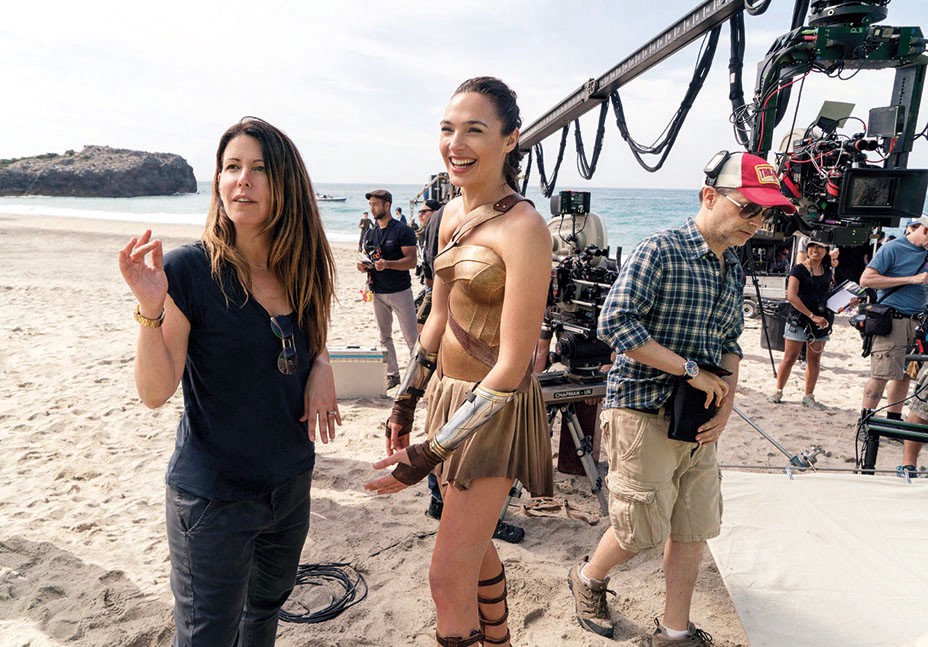“I can’t take on the history of 50 percent of the population just because I’m a woman,” Patty Jenkins told The Hollywood Reporter in an in-depth interview published earlier today. The “Wonder Woman” director was answering a question about the responsibility of stepping behind the camera for the most expensive film ever helmed by a woman. “I’m just trying to make the greatest version of ‘Wonder Woman’ that I can for the people who love the character as much as I do and hope that the movie lives up to all the pressure that’s on it,” she explained.
With a budget of $150 million, the pressure to do well at the box office is, of course, high. But the pressure is exponentially higher because Jenkins is a woman, and “Wonder Woman” is a female-led superhero story. If the movie underperforms at the box office, it will be used as evidence to support sexist — and untrue — arguments that women can’t direct big-budget movies and films about women don’t make money. As unfair as the expectations on Jenkins and “Wonder Woman” are, the “Monster” helmer was well-aware of the intense scrutiny she’d be under when she accepted the gig, and the potential consequences for future female-helmed tentpoles. And it’s why she turned down another blockbuster superhero movie.
“At one point, Jenkins was attached to direct Marvel’s ‘Thor: The Dark World,’ the critical misfire that Alan Taylor wound up shooting after Jenkins left the project (it ended up grossing $645 million worldwide),” THR writes. “She won’t say what transpired with that film but will talk more generally about a certain unnamed tentpole that she ultimately walked away from (rhymes with ‘s’more’).” Jenkins revealed, “There have been things that have crossed my path that seemed like troubled projects. And I thought, ‘If I take this, it’ll be a big disservice to women. If I take this knowing it’s going to be trouble and then it looks like it was me, that’s going to be a problem. If they do it with a man, it will just be yet another mistake that the studio made. But with me, it’s going to look like I dropped the ball, and it’s going to send a very bad message.’ So I’ve been very careful about what I take for that reason.”
Can you imagine a male director turning down the opportunity to direct a high-profile, lucrative job because he’s concerned that poor critical reception and/or disappointing returns would adversely affect his male peers? Nope, we can’t either. And that’s because male directors in Hollywood don’t have to worry about that happening. Like Jenkins said, male directors can recover from flops much more easily than female ones can. The playing field is anything but even.
THR repeatedly describes “Wonder Woman” as a “gamble” in the piece — but why? The misogyny directors like Jenkins encounter is obvious when you compare how her career and potential is perceived compared to male directors’. Jenkins’ feature directorial debut was “Monster,” a drama about serial killer Aileen Wuornos. The film earned an Oscar for star Charlize Theron, got great reviews, and earned $34.4 million domestically. Colin Trevorrow’s feature debut, the 2012 comedy “Safety Not Guaranteed,” grossed just $4 million. The film received positive buzz but did not make anywhere near the impact that “Monster” did. But Trevorrow was handed the reins to 2015’s big budget reboot “Jurassic World.” His next film, “The Book of Henry,” hits theaters in a couple weeks and Trevorrow is also booked to direct “Star Wars: Episode IX,” due in 2019. It’s clear: Hollywood sees emerging female directors as gambles and emerging male directors as investments.
Head over to The Hollywood Reporter to read the full feature with Jenkins, which touches on her career trajectory, directing style, and what Theron and “Wonder Woman’s” Gal Gadot thought about working with her.
“Wonder Woman” opens in theaters this Friday, June 2. The film is earning rave reviews, and currently boasts a 96 percent “Fresh” rating at Rotten Tomatoes. Last week Women in Film (WIF) launched a campaign encouraging folks to see “Wonder Woman” during its opening weekend, June 2–3.







